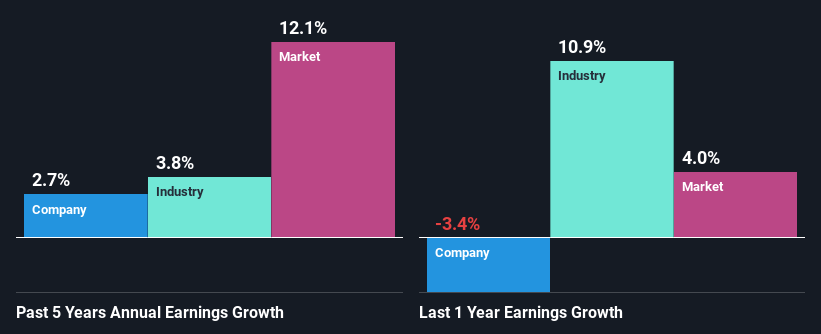- United Kingdom
- /
- Pharma
- /
- LSE:HLN
Haleon plc's (LON:HLN) Financials Are Too Obscure To Link With Current Share Price Momentum: What's In Store For the Stock?

Most readers would already know that Haleon's (LON:HLN) stock increased by 2.9% over the past week. Given that the stock prices usually follow long-term business performance, we wonder if the company's mixed financials could have any adverse effect on its current price price movement In this article, we decided to focus on Haleon's ROE.
Return on equity or ROE is an important factor to be considered by a shareholder because it tells them how effectively their capital is being reinvested. Put another way, it reveals the company's success at turning shareholder investments into profits.
View our latest analysis for Haleon
How Do You Calculate Return On Equity?
Return on equity can be calculated by using the formula:
Return on Equity = Net Profit (from continuing operations) ÷ Shareholders' Equity
So, based on the above formula, the ROE for Haleon is:
7.5% = UK£1.3b ÷ UK£17b (Based on the trailing twelve months to September 2024).
The 'return' is the profit over the last twelve months. That means that for every £1 worth of shareholders' equity, the company generated £0.08 in profit.
What Has ROE Got To Do With Earnings Growth?
So far, we've learned that ROE is a measure of a company's profitability. Depending on how much of these profits the company reinvests or "retains", and how effectively it does so, we are then able to assess a company’s earnings growth potential. Generally speaking, other things being equal, firms with a high return on equity and profit retention, have a higher growth rate than firms that don’t share these attributes.
Haleon's Earnings Growth And 7.5% ROE
At first glance, Haleon's ROE doesn't look very promising. We then compared the company's ROE to the broader industry and were disappointed to see that the ROE is lower than the industry average of 32%. Accordingly, Haleon's low net income growth of 2.7% over the past five years can possibly be explained by the low ROE amongst other factors.
We then compared Haleon's net income growth with the industry and found that the company's growth figure is lower than the average industry growth rate of 3.8% in the same 5-year period, which is a bit concerning.

The basis for attaching value to a company is, to a great extent, tied to its earnings growth. It’s important for an investor to know whether the market has priced in the company's expected earnings growth (or decline). By doing so, they will have an idea if the stock is headed into clear blue waters or if swampy waters await. What is HLN worth today? The intrinsic value infographic in our free research report helps visualize whether HLN is currently mispriced by the market.
Is Haleon Efficiently Re-investing Its Profits?
Despite having a normal three-year median payout ratio of 47% (or a retention ratio of 53% over the past three years, Haleon has seen very little growth in earnings as we saw above. Therefore, there might be some other reasons to explain the lack in that respect. For example, the business could be in decline.
Only recently, Haleon started paying a dividend. This means that the management might have concluded that its shareholders prefer dividends over earnings growth. Existing analyst estimates suggest that the company's future payout ratio is expected to drop to 37% over the next three years. As a result, the expected drop in Haleon's payout ratio explains the anticipated rise in the company's future ROE to 9.5%, over the same period.
Conclusion
In total, we're a bit ambivalent about Haleon's performance. While the company does have a high rate of profit retention, its low rate of return is probably hampering its earnings growth. With that said, the latest industry analyst forecasts reveal that the company's earnings are expected to accelerate. To know more about the latest analysts predictions for the company, check out this visualization of analyst forecasts for the company.
Valuation is complex, but we're here to simplify it.
Discover if Haleon might be undervalued or overvalued with our detailed analysis, featuring fair value estimates, potential risks, dividends, insider trades, and its financial condition.
Access Free AnalysisHave feedback on this article? Concerned about the content? Get in touch with us directly. Alternatively, email editorial-team (at) simplywallst.com.
This article by Simply Wall St is general in nature. We provide commentary based on historical data and analyst forecasts only using an unbiased methodology and our articles are not intended to be financial advice. It does not constitute a recommendation to buy or sell any stock, and does not take account of your objectives, or your financial situation. We aim to bring you long-term focused analysis driven by fundamental data. Note that our analysis may not factor in the latest price-sensitive company announcements or qualitative material. Simply Wall St has no position in any stocks mentioned.
About LSE:HLN
Haleon
Engages in the research, development, manufacture, and sale of various consumer healthcare products in North America, Europe, the Middle East, Africa, Latin America, and the Asia Pacific.
Solid track record and fair value.


